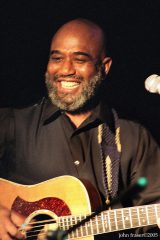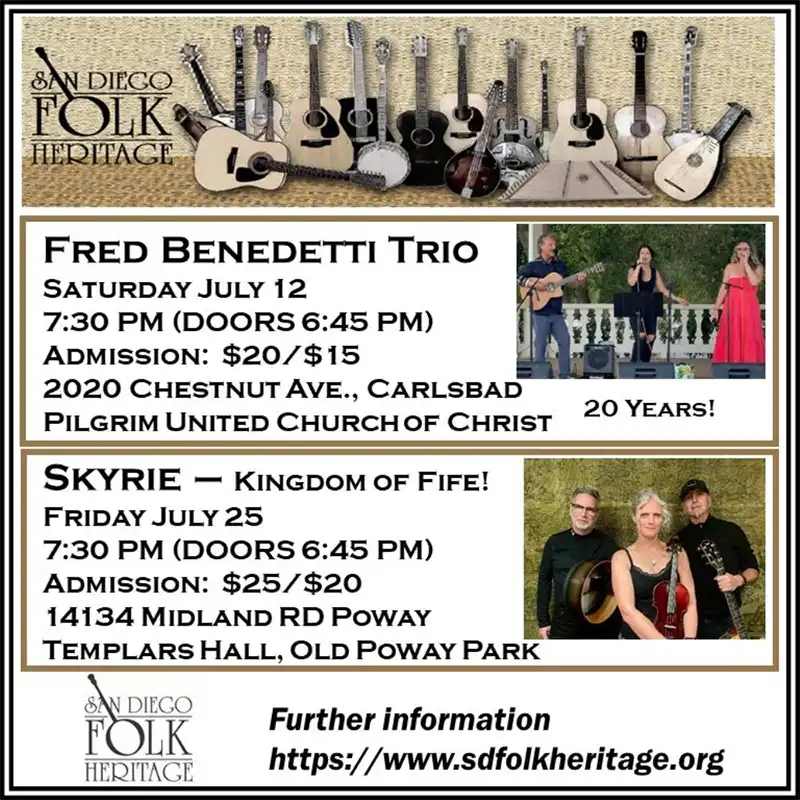Yesterday And Today
Josh White Jr. Turns Toward the Blues and His Father’s Legacy

Josh White Jr.
There aren’t many people who have lived a life along the crests of American history and its culture. For Josh White Jr., his life over the last 70 years has seen the depths of southern racism, the heights of musical celebration and celebrity success, and the kind of achievement that transcends it all. Born to cultural icon Josh White, in 1940, today he embraces his father’s legacy and has been an important catalyst in keeping his music and life story in the public eye. He’s also been an artist who has been willing to take his music any where that people are open to hearing the stories expressed through an acoustic blues guitar and his blues-soaked voice, which rings out with the depth of his soul.
When listening to Josh White Jr. it sometimes seems hauntingly like he and his folk-blues legend father are simply two parts of the same soul. At age four Josh White Jr. made his debut, dressed up to match his father on stage with his foot on a stool playing and singing with him at New York’s Cafe Society during in 1944. By 1949 he was cast in a Broadway show called How Long ’Til Summer. He won a special Tony award for Best Child Actor for this performance the same year. During that year it seemed he was sitting on top of the world or to put it more accurately, he was sitting on his father’s shoulders, who was certainly on top of the world. While Josh Jr.’s career was only beginning to take off, 1950 became a critical year for his father who would fall into a decline it would take a decade to recover from. But for Josh Sr. the years from his birth in 1914 until 1950 were eventful enough for an epic story of American rags-to-riches success and determination.
Josh White Sr. came up in the traditional American school of country Piedmont blues. He was raised to love music through the church of his minister father and Christian mother. By five years old he was singing in the church choir. His father was brutally murdered for throwing a bill collector out of his house when Josh Sr. was a mere seven years old. Both the gospel music and the killing of his father would leave an indelible mark on him that would influence his career throughout his all-too-short 55 years of life. But Josh Sr.’s early stories are so full of imagination and creativity it seems like it could play like good American fiction and makes you wonder why Hollywood hasn’t picked up his story. Like some folks say, “you can’t make this stuff up!”
Two months after his father’s death, seven-year-old Josh found he could pick up a sizable two dollars a week by leading a blind blues street singer named Blind Man Arnold to street corners and then help with entertainment by joining in with a tambourine. The street singer found that he was making more money with this gifted child who also learned to dance and sing. For a near decade Blind Man Arnold realized that he could rent Josh out to other blind street blues singers, as many as 66, including Blind Lemon Jefferson, Blind Blake, and Billy Joe Taggart. Soon, a student-teacher relationship developed between Josh and his guitar-playing, blues-singing employers. It wasn’t long before he mastered their guitar styles.
In 1927, Paramount Records was doing field recordings, hunting ethnic artists in Chicago where, because of his work with Blind Billy Joe Taggart, he was hired to back up new blues artists. He was 13 years old. He was kept under Taggart’s authority at this time. He first recorded with his name on the song “Scandalous and a Shame,” credited to Blind Joe Taggart and Joshua White. The story here is that Taggart had Josh bound to a type of servitude, never paying him for his recording and performances, making him sleep outside in alleys while Taggart rented hotel rooms. When a man from Paramount who was starting his own blues label found Josh, he told Taggart he would turn him for child abuse unless he let Josh go. Taggart released Josh from any obligations and soon Josh became a paid session musician in Chicago. With the money he earned, he eventually returned home to Greenville, South Carolina where his mother lived.
In 1930 a New York record company, ARC Records, came to Chicago looking for Josh White. They wanted the “boy who recorded for Paramount in 1928.” When they found him he agreed, with the influence of his mother, to sign a recording contract provided he would only record gospel music. As a result he was billed as “Josh White, the Singing Christian.” It didn’t take long until he succumbed to the temptation of the “the devil’s music,” otherwise known as the blues, and he began to accept session work for up-and-coming artists as well. In order to make this work, at 18 and still underage, he signed on as “Pinewood Tom” in 1932 for his blues work. ARC kept him recording gospel under his own name, but then added the name “Tippy Barton” as well. After he injured his left hand, a result of a bar fight, his doctors told him to have the hand amputated due to gangrene. He refused and his hand soon recovered but was immobile. Soon he found his way to a singing career and through exercise restored the use of his hand, which revived his recording and performing career. As he began playing private parties around Harlem, he was offered the role of Blind Lemon Jefferson for the Broadway musical, John Henry, whose character was the narrator of the play. While the casting directors had been searching for the right actor for the part before auditioning Josh, they searched through available “race” records for a suitable artist. They narrowed their search down to two artists: “Pinewood Tom” and “The Singing Christian.” Both artists were actually Josh White. The play opened to a limited run in 1940 with Paul Robeson as John Henry and Josh White as Blind Lemon Jefferson.
Throughout the 1940s, Josh’s fortune’s surged him into a unique spotlight as a black folk and blues singer and a budding stage and film actor. He collaborated with the likes of Woody Guthrie, Leadbelly, and Burl Ives on radio broadcasts produced by Alan Lomax and directed by film director Nicholas Ray. He also joined the Almanac Singers during this time. He scored a hit with the song “Careless Love” and recorded the John Hammond-produced Chain Gang album about the plight of the African-American convict, which was endorsed by President Franklin Roosevelt. In 1940 he performed at President Roosevelt’s inauguration. Indeed, White became the first African-American to give a command performance at the White House for the Roosevelts. It was during this time his most popular recording “One Meatball” was released. It became a huge success and was later covered by the Andrew Sisters and Bing Crosby. He was also known around Greenwich Village’s first integrated nightclub, the left-leaning Cafe Society. It was there that he held a near ten-year residency and found his musical experience broaden into cabaret and pop styles. He also became well-known among New York City socialites as the “darling of Fifth Avenue.” Even Lena Horne and Eartha Kitt considered him a mentor. In 1945 Paramount Studios had plans for a movie about Alan Lomax called Adventures of a Ballad Hunter to star Bing Crosby and Josh White as Leadbelly. Although the film never made it to production, White appeared in other films including The Crimson Canary and most notably, The Walking Hills, which was directed by John Sturges and starred Arthur Kennedy and Randolph Scott. Its year of release was 1950. It would be his last film.
Because he was known for his stand on civil rights by openly singing protest songs and songs against segregation, Josh came under the scrutiny of the FBI during the McCarthy era. After threats and several unjust interrogations, Josh agreed, against the advice of former first-lady, Eleanor Roosevelt and Paul Robeson, to appear before the House Un-American Activities Committee. While he didn’t give them names and only defended his own patriotism while he condemned the Communist Party, he was blacklisted by both the left and the right. He moved to England throughout much of the ’50s. He lived out his last years by becoming the first artist signed to Jack Holzman’s Electra Records, which would later sign such classic rock acts as The Doors and Love, and he would continue to play before anyone who invited him. This included a television with President Kennedy and an invitation to perform at President Lyndon Johnson’s inauguration. He died of heart disease in 1969, seeing his career back in full swing and receiving admiration from younger people as influence.
In 1940, during the beginning of his father’s most fruitful years, Josh Jr. was born. From his Tony win in 1949 until the ’60s Josh would see unusual success for a young African-American child. Shielded, at least situationally from his father’s trials, Josh continued on in theater. He appeared in plays and more than 50 guest-starring roles on television. He recorded his first album, See Saw, in 1956. By the early ’60s, well into adulthood, finding work as an actor became increasingly difficult. But he found his redemption in the folk music boom movement during that time. This was largely inspired by the Kingston Trio’s success in the late ’50s when they decided to pick up where the black-listed Weavers, including Josh Sr.’s old friend Pete Seeger, left off. Josh had a definite advantage during the folk revival and the eventual emergence of a new generation of blues fans in the late ’60s with his father. Unlike many celebrity off-spring and the generation of this time, Josh Jr. was close to his father and learned from him until his death.
Josh Jr. immersed himself in American folk music during the ’60s. Like his father, he spread his wings into diverse forms and styles. His repertoire today ranges from country blues to traditional folk. But he also has ventured into children’s music, world music, country, jazz, rock, and pop standards. He retains his father’s gift for intricate folk-blues guitar work and a gospel-fevered vocal style that can sometimes send chills down your spine. For the last half-decade, Josh Jr. has rarely been seen in the company of the Cafe Society kind of crowd, preferring, like many folksingers of his era, to play for college students, schools, and folk-music enthusiasts at smaller venues. Although much of his music is strong in its pop sensibility, he never pursued pop success. Recently, he has paid tribute to his blues roots and also, as on his latest album Turning for the Blues, which is a lean, close-to-the-bone album of acoustic blues covers. The album is filled with fresh takes on such old blues classics as “CC Rider,” “Been Down So Long,” and his father’s own “Careless Love.”
One of the most important song interpretations he has done is the song “Cortelia Clark” from the album of the same name. The song was written by the oft-overlooked Mickey Newbury, possibly one of the five best American songwriters. The song describes the journey of an old black man and young boy to see a newly built train, the first time it comes through a southern town. It is a portrait song Newbury was so good at painting through melody and lyric. In Josh’s hands, with acting and vocal skill, he brings it alive full on the canvas. The familiarity of it is in the fact that another great vocalist of his time took one of Mickey Newbury’s song about the south and did the same thing: It was Mickey’s mood and melodic arrangement medley called “Southern Triology,” which Elvis immortalized on stage over three decades ago. With his own arrangement of a Newbury song, Josh walks into the same Americana landscape Elvis once ventured into. Over the years Josh Jr. continues to create vibrant, original, and soulful blues with traces of jazz mixed in through his blues.
But, even though in some cases, when a child carries the legacy of the legend and music of a famous parent, Josh’s stance has always been as though he’s an individualized extension of much of what his father was doing during his life time. It’s as though he has no worry about the shadow Josh Sr. has cast; maybe, at times, it’s more like shade. When listening to Josh Jr.’s considerable body of work it is clear he’s more than comfortable with his father’s legacy and its influence on him today. It’s as though he continues to cast the same shadow of his father rather than being covered by it. This has resulted in the best of possible worlds for the legacy of Josh White Sr. with his son capably able to bring him back into the spotlight as though he is simply a part of his being. This may be the deepest truth to be found in the musical legacy that is found in these two great souls.
Don’t miss Josh White Jr., playing at a San Diego Folk Heritage concert, on Saturday, November 12, 7:30pm, at the San Dieguito United Methodist Church, 170 Calle Magdalena, Encinitas. Thanks to a generous donation from a Folk Heritage member, admission is only $10.






